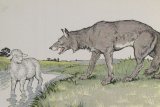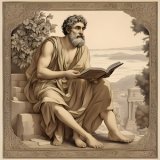The Wolf and the Lamb
"The Wolf and the Lamb" is a classic fable by Aesop that imparts a moral lesson about innocence and victim blaming. In the story, a lamb is unjustly accused and killed by a wolf, reflecting the power dynamics in many real-life situations. The wolf, using its might and authority, places blame on the innocent lamb to justify his action. It highlights the manipulation that arises in uneven power structures and societal injustice where the weak are often defenseless against the strong.
A stray Lamb stood drinking early one morning on the bank of a woodland stream. That very same morning a hungry Wolf came by farther up the stream, hunting for something to eat. He soon got his eyes on the Lamb. As a rule Mr. Wolf snapped up such delicious morsels without making any bones about it, but this Lamb looked so very helpless and innocent that the Wolf felt he ought to have some kind of an excuse for taking its life. "How dare you paddle around in my stream and stir up all the mud!" he shouted fiercely. "You deserve to be punished severely for your rashness!" "But, your highness," replied the trembling Lamb, "do not be angry! I cannot possibly muddy the water you are drinking up there. Remember, you are upstream and I am downstream." "You do muddy it!" retorted the Wolf savagely. "And besides, I have heard that you told lies about me last year!" "How could I have done so?" pleaded the Lamb. "I wasn't born until this year." "If it wasn't you, it was your brother!" "I have no brothers." "Well, then," snarled the Wolf, "It was someone in your family anyway. But no matter who it was, I do not intend to be talked out of my breakfast." And without more words the Wolf seized the poor Lamb and carried her off to the forest. The tyrant can always find an excuse for his tyranny. The unjust will not listen to the reasoning of the innocent.
Translation
Translate and read this book in other languages:
Select another language:
- - Select -
- 简体中文 (Chinese - Simplified)
- 繁體中文 (Chinese - Traditional)
- Español (Spanish)
- Esperanto (Esperanto)
- 日本語 (Japanese)
- Português (Portuguese)
- Deutsch (German)
- العربية (Arabic)
- Français (French)
- Русский (Russian)
- ಕನ್ನಡ (Kannada)
- 한국어 (Korean)
- עברית (Hebrew)
- Gaeilge (Irish)
- Українська (Ukrainian)
- اردو (Urdu)
- Magyar (Hungarian)
- मानक हिन्दी (Hindi)
- Indonesia (Indonesian)
- Italiano (Italian)
- தமிழ் (Tamil)
- Türkçe (Turkish)
- తెలుగు (Telugu)
- ภาษาไทย (Thai)
- Tiếng Việt (Vietnamese)
- Čeština (Czech)
- Polski (Polish)
- Bahasa Indonesia (Indonesian)
- Românește (Romanian)
- Nederlands (Dutch)
- Ελληνικά (Greek)
- Latinum (Latin)
- Svenska (Swedish)
- Dansk (Danish)
- Suomi (Finnish)
- فارسی (Persian)
- ייִדיש (Yiddish)
- հայերեն (Armenian)
- Norsk (Norwegian)
- English (English)
Citation
Use the citation below to add this book to your bibliography:
Style:MLAChicagoAPA
"The Wolf and the Lamb Books." Literature.com. STANDS4 LLC, 2025. Web. 6 Mar. 2025. <https://www.literature.com/book/the_wolf_and_the_lamb_2308>.








Discuss this The Wolf and the Lamb book with the community:
Report Comment
We're doing our best to make sure our content is useful, accurate and safe.
If by any chance you spot an inappropriate comment while navigating through our website please use this form to let us know, and we'll take care of it shortly.
Attachment
You need to be logged in to favorite.
Log In